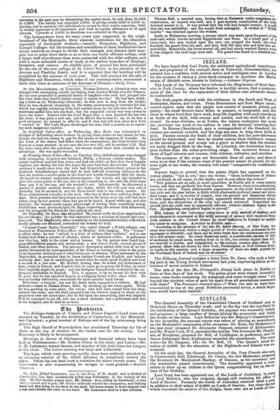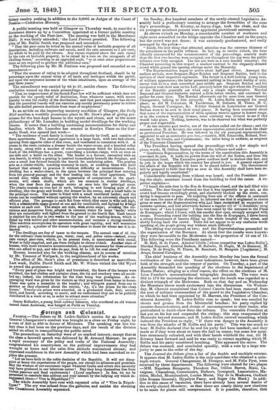SCOTLAND.
The General Assembly of the Established Church of Scotland met at Holyrood House on Thursday week; and as the'day was the 'one fixed for the celebration of the Queen's birthday, the pageant was unusually stately and gorgeous; 'a laige number of troops joining the procession and lining the streets on the route. Lord Belhaven was her Majesty's Commissioner. In the Assembly, the unusual course was taken of moving an amendment on the Moderator's nomination of his successor: Dr. Built, the Moderator of the past *11/Sj.‘proposed Dr. Alexander Simpson, minister of Eirknevrton; and Mr. Walter Cook,W.S., seconded the Motions The Reverend Mr. Hender- son, of -KinclaVen, proposed Dr. Bells of Linlithgow, in preference; and Sir James Dalrymple Horn Elphinstone eeconded.thei amendment. The votes were—for Dr. Simpson, 191; for Dr. Bell, 75. The Queen's usual do- nation of 2,0001. for the education of the Highlands and Islands was an-
nounced. .
On the same-day, the General Assembly of the Free Church also met, in Cannonmille Hall, Edinburgh. Dr. Clason, the late Moderator, proposed the Reverend Dr. Mackintosh Mackay, of Dunoon, as his successor; and the nomination passed unanimously. The Assembly appointed a com- mittee to drays up an address to.the Queen congratulating her on the re'
turn of her birthday. '
Lord Ivory has been appointed one of the Lords of Justiciary, in root of Lord Medwyn, who has resigned, though still retaining his office of Lord of Session. Formerly the Lords. of Justiciary received 6001. a year in addition-to thelesalary or2i0001. as Lords of Session; but since tke 'ant which increased. the salaries of the Judges, those who. SOL as Lords of Jas-
tioiary receive nothing in addition to the 3,0001. as Judges of the Court of Session.—Caledonian Mercury.
A public 'meeting was held at Glasgow on Thursday week, to cons'der a document drawn up by a Committee appointed at a former public meeting on the working of the Poor-law. The meeting was held in the Merchants Hall; it was thinly attended; • the Lord Provost presided. The following plan of Mr. Baillie Smith was proposed and seconded-
" That the .poor-rates be levied on the annual value of heritable property of all descriptions, including railways and canals, until the rate amounts to 5 per cent; the whole to be paid by the owners. Any excess required above the sum raised by the rate on heritable property, to be raised by a rate on the occupants of all dwelling-house," according to an appended scale, "or at such other proportionate rates as are required to produce the additional sum."
The following plan by Mr. M. Pattison was proposed and seconded as an amendment—
"That the manner of rating to be adopted throughout Scotland, should be by percentage upon the annual value of all lands and heritages withht the parish, and upon the estimated income of the whole inhabitants, upon an average of the past three years." The amendment was carried by 66 to 37, amidst cheers. The following resolution wound up the main proceedings- " That no improvement of the Scotch Poor-law will be sufficient which does not provide for the speedy relief of destitution, from whatever cause, with means thereby to test the reality of the destitution; and that past experience has shown that the parochial boards will not exercise any merely permissory power to relieve the able-bodied persons destitute from want of employment."
In an article on the improving sanatory condition of Glasgow, the Daily Mail ascribes a worthily prominent place to Mr. Stow's plan of giving pre- miums for the best-kept houses in the wynds and closes, and to the acute philanthropy of Mr. Lumsdee in building model-dwellings for the working classes. It seems that a building containing accommodation for thirty-one families, which Mr. Lumsden has erected in Roselyn Place on the Gar- scubs Road, was opened last week- " The residence of each family is closed in distinctly by itself, and consists of three apartments. The central apartment is a large room, with two bed-closets, opening from opposite sides of this room, and ventilated in connexion with it. A recess in the room contains a dresser beside the water-crane, and a boarded cellar for coals, along with a number of other conveniences fitted for kitchen-work. Each of the dwellings has a grate, resembling a kitchen-range, with an oven on one side and a boiler on the other. The fender is a fixture, connected with an iron hearth, in which a grating is inserted immediately beneath the fireplace, and over a small box formed beneath the hearth for containing ashes. The grating acts as a cinder-riddle, teaching economy in coals, or enabling those who have learned that already to practise it without difficulty or inconvenience. Each dwelling has a water-closet, in the space between the principal door entering from the general passage and the door leading into the chief apartment. The second door, while adding to the appearance of compactness in the apart- ments, will check drafts, which are too common in similar dwellings, when the door from the passage enters at once into the principal room. The closets contain an iron bed in each, belonging to and forming part of the dwelling, like the grate and fender, the dresser in the recess, and a small table in the principal room. The latter is fitted with a small ventilated larder; and the rooms can be ventilated without opening the window, by an extremely simple and efficient plan. The passage in each flat from which they enter is wide and h*b, With a cobeiderable space grated at one end for ventilation, and lighted-by ltiarge
window at each end. The stairs are wide, with e ' stone steps; avoiding the elr- onitous and dangerous form ,edopted in common stairs for large 'lands -while they are remarkably well lighted from the ground to the fourth flat. Each tenant is entitled for one day in two weeks to the use of the washing-house, which is fitted up with boilers and other accommodation, and contains a drying-machine. This machine accomplishes its operation with great rapidity, and will economize time greatly; a.matter of the utmost importance to those for whose sae it is in- tended.
" The dwellings are free of taxes to the tenants. The annual rent of 6/. 10s. for the ordinary class includes gas, water, road, and police rates—iadeed, every rate except poor-rate, which, in its present form, is unconnected with rental. Water is fully supplied, and gas from twilight to eleven o'clock. Another class of houses, with more extensive accommodation, is equally necessary for those artisans who can afford to pay, and who do pay, from 81. to 121. for rent alone."
Houses, intended also for the working classes, are in course of erection by Mr. Tennent of Wellpark, in the neighbourhood of his works. The effect of Mr. Stow's plan of premiums is described as marvellous. Last week, Baillie David Smith and Mr. W. Wilson visited the Old Wynd to award the,premiums-
" Every pane of glass was bright and burnished, the floors of the houses were scrubbed, the bed-clothes and curtains clean, the tin and crockery were all scrub- bed up; indeed, the reformation for the time being was prodigious. An en- couraging word was given by the visiters as they progressed from house to house. There was quite a sensation in the locality; and whispers passed from one to another as they clustered about the entries, 'Ay, it's the prizes for the clean booses.' Twenty-six prizes were awarded, on a graduated scale, first, second, third, and fourth, according to merit; and we understand they are to be publicly distributed in a week or so, in order to attract more attention."
James Kellocher, a young Irish railway labourer, who murdered an old woman named Janet Anderson, was hanged at Perth on Tuesday.



























 Previous page
Previous page